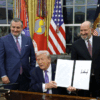On Wednesday, President Obama will make a personal push to sell the flawed Iran deal to the American public and Congress.
The president’s efforts to sell his bad deal are unsurprising, considering that the more Americans have learned about the deal, the less they like it.
They have plenty of reasons for skepticism.
The deal with Iran is deeply flawed and rewards years of Iranian cheating and lying about the nature of its nuclear program.
Iran has never reasonably explained its nuclear activities.
This is because the only plausible answer is that Iran interested in pursuing a nuclear weapon program, including experiments with explosives.
This is definitely more than an academic interest in shaping highly enriched uranium into a sphere (one needs two such spheres for a nuclear device).
The deal leaves the Iranian nuclear infrastructure largely intact—and dismantles sanctions that successive administrations and Congress have put into place, including on Iranians directly responsible for American deaths.
Even the Obama administration recognized that these sanctions likely slowed down Iran’s nuclear progress.
The American people are also skeptical of the administration’s efforts to circumvent Congress.
Last week, U.S. Secretary of State John Kerry admitted as much when he said that the agreement wasn’t treated as a treaty “because you can’t pass a treaty anymore.”
Political expediency was clearly not the primary concern of our founding fathers when the Constitution was drafted. If the Iran deal can’t pass as a treaty, then John Kerry has no one but himself to blame.
Had the administration done a better job in negotiating the agreement and not giving in to Iran’s dangerous demands, the deal would have sailed through Congress, and Americans would have supported it.
To add insult to injury, the president chose to send the deal to the United Nations before he sent it to Congress.
Americans like to be guided by the old adage: “Trust, but verify.”
Obama does not lack trust when it comes to dealing with Iran, the world’s largest sponsor of terrorism—but he is short on verification.
Americans are not permitted to be a part of inspections teams that will go to Iran to monitor its nuclear progress.
Iran will be allowed to take its own environmental samples.
Given its history of cheating and lying, this is akin to letting a fox guard a chicken coop. The agreement is fairly ambiguous when it comes to specifying provisions Iran has to comply with.
Even worse, American officials did not read and Congress does not have access to agreements between Iran and the International Atomic Energy Agency responsible for verification.
Not only does the administration demand that Congress go along with this bizarre arrangement, but it is concealing that it doesn’t know what the arrangement actually is.
Americans have plenty to be skeptical about when it comes to the Iran deal.
Fortunately, there are much better alternatives—that don’t involve war as the administration has been trying to convince the American public.
The U.S. can get a much better deal if it gets back to the negotiating table.
Turns out, even the French think so.































